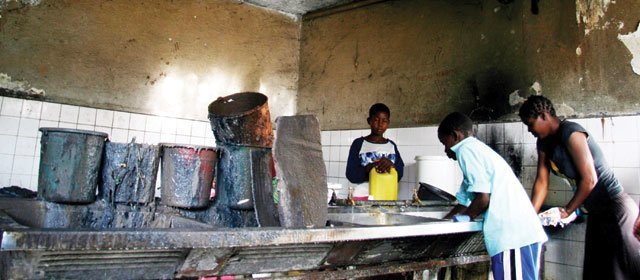
Most people living in flats in Mbare have resorted to using the bucket toilet system when nature calls because they have not had running water for the past three weeks.
Report by Jairos Saunyama
Each morning, the residents empty buckets full of human waste into Mukuvisi River and other open spaces because their toilets have since blocked due to a shortage of water.
This has exposed not only residents of Mbare to diseases such as cholera and typhoid, but all the people who live downstream. This is also affecting residents of Harare and Chitungwiza, who drink poorly treated water from Lake Chivero.
When The Standard crew visited the populous suburb last week, residents said they defecated in buckets in their homes and threw the waste into Mukuvisi River during the night or in the early morning hours.
Most toilet chambers in flats like Nenyere, Matapi, Tagarika and other areas of Mbare were last week overflowing with human waste.
Some of the desperate residents wrap their faeces and throw them into the street or any open space available. Human waste could be seen spattered on toilet floors where the residents do their laundry, using heavily-polluted water from Mukuvisi River and storm drains.
“We have resorted to these desperate and shameful ways since the sewer system has stopped functioning because of water problems,” said one woman who identified herself as Mai Sean of Tagarika Flats. “We have not been using real toilets since last week.”
- Chamisa under fire over US$120K donation
- Mavhunga puts DeMbare into Chibuku quarterfinals
- Pension funds bet on Cabora Bassa oilfields
- Councils defy govt fire tender directive
Keep Reading
Another resident, Ariel Shumba from Matapi Flats said it was a health hazard to use toilets which had become home to maggots and flies.
“The toilet is just a mess and no one can attempt to go inside. The situation is unbearable and we don’t know what to do,” said Shumba. “People are now disposing their waste during the night or in the early hours of the morning. We are now exposed to cholera and other diseases.”
The Standard news crew could see some children playing soccer barefoot on a pitch dotted with human waste, oblivious of the danger they were exposed to.
“It is by God’s grace that our children have not yet contracted diseases because they play on this dirty pitch every day,” said Mai Sean.
The City of Harare has been struggling to supply adequate and clean drinking water to residents for the past couple of years. Several suburbs in the capital have their taps running only two days a week while eastern suburbs such as Glen Lorne, Borrowdale and Greendale have experienced water woes for years. This has forced many residents to drill boreholes on their properties.
Low-income suburbs such as Budiriro, Mufakose, Kuwadzana, Glen View and Kambuzuma also face serious water problems. In most cases, the residents are seen queuing at boreholes sunk by Unicef, some of which are contaminated, making the water unfit for domestic use.
Over 4 000 people have succumbed to cholera and typhoid since 2008. This has been attributed mainly to the water crisis in Harare’s high-density, low-income areas.
Council spokesperson, Leslie Gwindi recently said water problems in Harare were a structural problem that required huge amounts of money to resolve.
“That is a universal problem. The areas in question are those that once went for years without water and it requires millions of dollars to sort out the problems. We do not have that kind of money, but we are trying our best to improve the situation,” said Gwindi.











